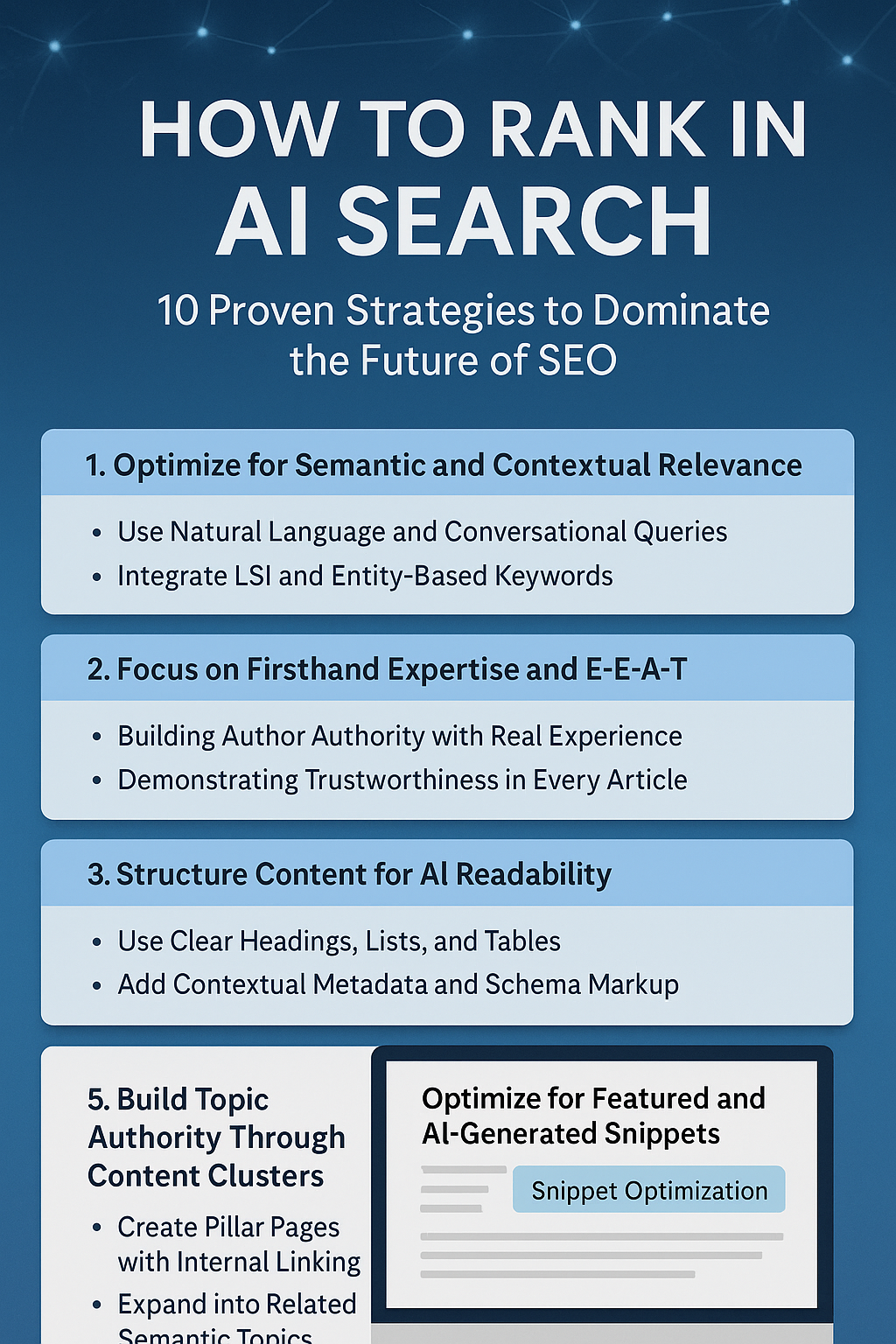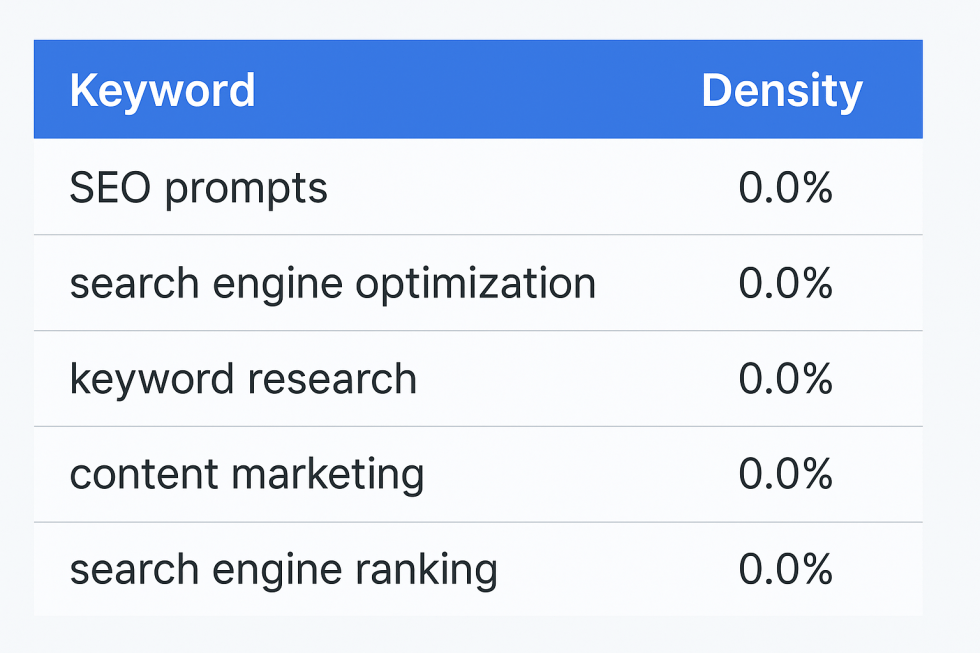
Introduction: The Rise of AI Search Engines and What It Means for SEO
The digital world is changing faster than ever. With AI-driven search engines like Google’s Search Generative Experience (SGE), ChatGPT Search, and Perplexity AI, we’ve entered a new era where search results are not just links — they’re intelligent answers.
If you’re wondering how to rank in AI search, the old keyword-stuffing tactics won’t cut it anymore. AI search is all about context, relevance, authority, and conversational understanding. This new landscape rewards brands and creators who can combine technical SEO with deep subject expertise and natural, human-like communication.
Let’s dive into the proven strategies that will help your content stand out — not just in search results, but in AI-generated summaries and recommendations that shape the future of discoverability.
Understanding AI Search: How It Differs from Traditional Search
What Is AI Search?
AI search uses artificial intelligence, natural language processing (NLP) , and machine learning to understand user intent beyond keywords. Unlike traditional search, which relies on index-based ranking, AI search engines generate direct, conversational answers drawn from a wide range of sources.
How Generative AI Search Works (Google SGE, ChatGPT Search, Perplexity)
- Google SGE (Search Generative Experience) creates synthesized answers using multiple web sources.
- ChatGPT Search and Perplexity provide conversational, context-aware responses that summarize the best content. To rank here, your content must be clear, accurate, and semantically rich — easily readable by AI models.
The Role of Machine Learning in Ranking Decisions
AI systems continuously learn which content best satisfies user intent. This means user engagement metrics , authority signals, and reliability all influence ranking visibility in AI-generated results.
Why Traditional SEO Alone No Longer Works
The Shift from Keywords to Intent and Context
AI doesn’t just scan for keywords — it interprets meaning. So, to rank in AI search, your content must answer why a query matters, not just what it is. Semantic keywords and structured narratives help AI models grasp your content’s full depth.
Content Quality Signals AI Engines Prioritize
Search AI systems favor:
- Firsthand experience (E-E-A-T)
- Data-backed insights
- Updated, factual content. These signals help your brand establish trustworthiness and authority, key ranking factors in AI search systems.
Top Strategies on How to Rank in AI Search
1. Optimize for Semantic and Contextual Relevance
Use Natural Language and Conversational Queries
People now talk to AI search engines like they talk to humans. Incorporate natural, question-style headings such as “What are the best ways to rank in AI search?” instead of robotic phrasing.
Integrate LSI and Entity-Based Keywords
Entity optimization helps AI understand relationships between topics. Use latent semantic indexing (LSI) keywords to connect ideas — for example, “AI SEO,” “semantic search,” “Google SGE optimization.”
2. Focus on Firsthand Expertise and E-E-A-T
Building Author Authority with Real Experience
Show your expertise through case studies, personal experiences, and professional credentials. AI search systems analyze author profiles for credibility signals.
Demonstrating Trustworthiness in Every Article
Cite credible sources, link to external authorities (like Google Search Central), and maintain transparent content updates.
3. Structure Content for AI Readability
Use Clear Headings, Lists, and Tables
AI prefers well-structured data. Break your content into scannable sections with logical hierarchies. Lists and tables improve both reader engagement and AI comprehension.
Add Contextual Metadata and Schema Markup
Use the FAQ, Article, and HowTo schema to help AI extract structured information directly from your page.
4. Optimize for Featured and AI-Generated Snippets
Craft Concise, Direct Answers for AI Summaries
AI search engines often extract short, structured responses to show in conversational summaries. Each paragraph should aim to answer one question clearly, ideally within 40–60 words.
Leverage FAQs and Structured Answers
Add a Frequently Asked Questions (FAQ) section at the end of each article. It helps AI models categorize and reuse your content in response to conversational user queries.
5. Build Topic Authority Through Content Clusters
Create Pillar Pages with Internal Linking
Build a “pillar” post around your main topic — in this case, how to rank in AI search — then support it with smaller “cluster” articles linked to a link-building campaign back to the pillar. This signals to AI that your site owns that topic.
Expand into Related Semantic Topics
Cover related subtopics such as AI SEO tools, semantic search optimization, and E-E-A-T strategies. Interlinking these helps AI map your authority web.
6. Strengthen Website Technical SEO for AI Crawlers
Improve Page Speed and Mobile Usability
Fast, mobile-optimized pages enhance user experience and ranking potential. Tools like Google PageSpeed Insights and Lighthouse can pinpoint bottlenecks.
Enhance Crawlability with Updated XML Sitemaps
Ensure your sitemaps reflect all live, indexable pages. Use structured data markup to guide AI systems more effectively through your site hierarchy.
7. Integrate AI Tools in Your SEO Workflow
Using AI for Keyword Clustering and Optimization
AI keyword tools like Surfer SEO, MarketMuse, and Clearscope identify gaps and help fine-tune topic clusters based on semantic relationships.
AI-Powered Content Gap Analysis and Intent Mapping
Leverage AI analytics to discover new search intents — “what users really mean” — and adjust your content for those conversational needs.
8. Optimize for Voice and Conversational Search
Implement Long-Tail, Human-Like Queries
Voice searches are longer and more conversational. Use natural questions like “How do I rank higher in AI search engines?” to align with AI query models.
Focus on Local and Contextual Intent
Include context markers like “near me”, “for small businesses”, or “for bloggers” to increase your ranking chances in personalized AI searches.
9. Strengthen Backlinks and Mentions Using AI Outreach
Identifying High-Value Link Opportunities with AI
AI outreach tools such as BuzzSumo and Pitchbox can help find the most relevant and high-authority backlinks within your niche.
Building Digital PR with AI Insights
Monitor brand mentions and sentiment using AI PR monitoring tools to grow your online reputation — a key signal for AI-driven authority ranking.
10. Continuously Monitor AI Search Visibility Metrics
How to Track AI Rankings and Visibility
Platforms like SEMrush, Ahrefs, and Surfer are now rolling out AI visibility metrics that measure your performance in AI search summaries and featured results.
Tools to Analyze AI-Generated Search Traffic
Tools such as AlsoAsked, AnswerThePublic, and Perplexity analytics help analyze what AI is surfacing from your domain, revealing which content earns visibility.
Common Mistakes to Avoid When Optimizing for AI Search
- Relying too heavily on keyword density
- Ignoring structured data or schema markup
- Writing content without E-E-A-T validation
- Failing to update outdated articles
- Over-optimizing with unnatural phrasing
Avoid these pitfalls to keep your content future-proof and AI-friendly.
Future of SEO: Adapting to AI-Driven Search Ecosystems
The future of SEO lies in AI integration, voice search optimization, and data-driven content ecosystems. As AI continues to personalize and synthesize information, content that demonstrates real human expertise, context awareness, and credibility will consistently rank higher.
SEO professionals will need to evolve into AI content strategists — balancing data science with storytelling.
FAQs About How to Rank in AI Search
Conclusion: Mastering the Future of Search Optimization
AI search isn’t replacing SEO — it’s redefining it. To rank in AI-driven results, focus on semantic relevance, real expertise, structured data, and conversational clarity. By adapting early, you’ll stay ahead of competitors and secure your place in the evolving world of intelligent search engines.
📧 Stay Updated
Get the latest web development tips and insights delivered to your inbox.




